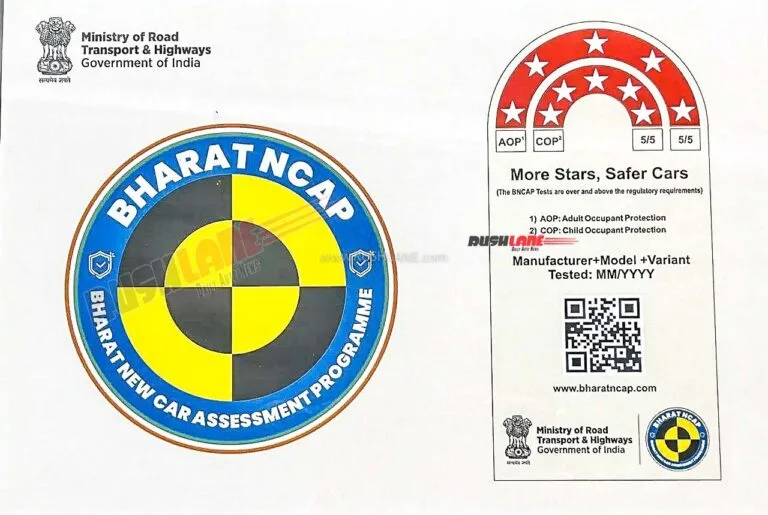In a significant development, Indian automakers will no longer need to send their vehicles to the Global New Car Assessment Programme (Global NCAP) for crash testing. Instead, India now has its own version called Bharat NCAP (Bharat New Car Assessment Programme), which will kick off its operations in October. Modeled after its global counterpart, Bharat NCAP will put Indian cars through a series of crash tests, determining their safety ratings on a scale from one to five stars. These safety assessments will take place when an automaker voluntarily submits their vehicle to the agency. Although it’s not yet official which car will be the first to undergo Bharat NCAP crash testing, we’ll take a closer look at five SUVs that have not been tested by any agency yet, making us curious about their potential safety performance.
Maruti Suzuki Grand Vitara
Maruti Suzuki injected fresh energy into the compact SUV segment with the launch of the Grand Vitara in 2022. This SUV boasts several features that promise a safe driving experience. The entry-level variant of the Grand Vitara includes seatbelt reminders, child seat anchors, middle rear three-point seatbelts, ESP, a 360-degree camera, tire pressure monitoring system, hill descent control, and an anti-theft engine immobilizer, among other features. The mid and top-spec variants come with a standard set of six airbags, including dual front airbags.
Maruti Suzuki later added a new safety feature called the Acoustic Vehicle Alerting System (AVAS). This system generates a sound to alert pedestrians, enhancing their safety. While the entry-level Grand Vitara may not score high in crash tests due to its limited airbag configuration, the mid and top variants with six airbags are expected to perform well, potentially earning a four-star safety rating.
Honda Elevate
Honda claims that its SUVs are among the strongest in terms of build quality. They have also enhanced safety through various features, including Advanced Driver Assistance Systems (ADAS), six airbags, ISOFIX child seat mounts, hill-start assist, and a rear parking camera. Elevate is likely to achieve a 5-star rating, making it one of the safest cars in India. Honda’s other models, City and Jazz, previously secured a 4-star rating in the Global NCAP.
Maruti Suzuki Jimny
The Jimny, launched by Maruti Suzuki this year, aims to challenge the Mahindra Thar in the lifestyle SUV segment. In terms of safety, the Jimny is equipped with six airbags, ABS with EBD, ESP, hill-hold control, hill descent control, brake assist, side-impact door beams, front occupants’ seatbelt pre-tensioner with force limiter, three-point seatbelts, ISOFIX child seat mounts, a rear-view camera, and more.
The global three-door version of the Jimny was previously tested by Euro NCAP, ANCAP, and JNCAP in 2018, receiving a 3-star safety rating. With the added safety features in the Indian-spec five-door Jimny, there’s hope for an improved safety performance in Bharat NCAP.
Hyundai Exter
The Korean automaker has loaded its smallest SUV, the Exter, with numerous safety features. These include ISOFIX mounts for child safety, 3-point seatbelts for adults, electronic stability control, hill-start assist, hill descent control, vehicle stability management, and 40 advanced features as standard. Additionally, it comes with six airbags.
With such an array of safety features in a compact SUV, the Exter may perform well in crash tests, potentially earning a 4-star rating in Bharat NCAP.
Kia Seltos
The new-generation Seltos received updates that include a Level 2 ADAS. Kia boasts about 15 strong safety features in the Seltos, making it a safe bet in the SUV segment. Apart from ADAS, the SUV is equipped with six airbags, blind-spot detection with a 360-degree camera, electronic stability control, hill-start assist control, and vehicle stability management.
Kia previously sent the Seltos for Global NCAP crash testing, receiving a 3-star rating. However, the recently launched Seltos, already showcased globally, achieved a 5-star rating in the Australian New Car Assessment Program (ANCAP). It is expected to perform well in Bharat NCAP as well.
In conclusion, Bharat NCAP’s introduction is a significant step towards ensuring the safety of Indian-made vehicles. With more rigorous safety assessments, it will encourage automakers to prioritize safety features in their cars. The SUVs mentioned above, once tested by Bharat NCAP, will provide valuable insights into their safety performance.
FAQs
Q1. What is Bharat NCAP?
Ans: Bharat NCAP is the Indian version of the Global New Car Assessment Programme (Global NCAP) that conducts safety assessments and crash tests on vehicles to determine their safety ratings.
Q2. When will Bharat NCAP start its operations?
Ans: Bharat NCAP is set to commence its operations in October.
Q3. How are safety ratings determined in Bharat NCAP?
Ans: Safety ratings in Bharat NCAP range from one to five stars, with higher stars indicating better safety performance.
Q4. Which SUVs are likely to be the first to undergo Bharat NCAP testing?
Ans: While it’s not officially confirmed, SUVs like Maruti Suzuki Grand Vitara, Honda Elevate, Maruti Suzuki Jimny, Hyundai Exter, and Kia Seltos are potential candidates for the first round of testing.
Q5. Why is Bharat NCAP important for Indian car buyers?
Ans: Bharat NCAP provides car buyers with valuable information about the safety performance of Indian-made vehicles, helping them make informed decisions when purchasing a car.
